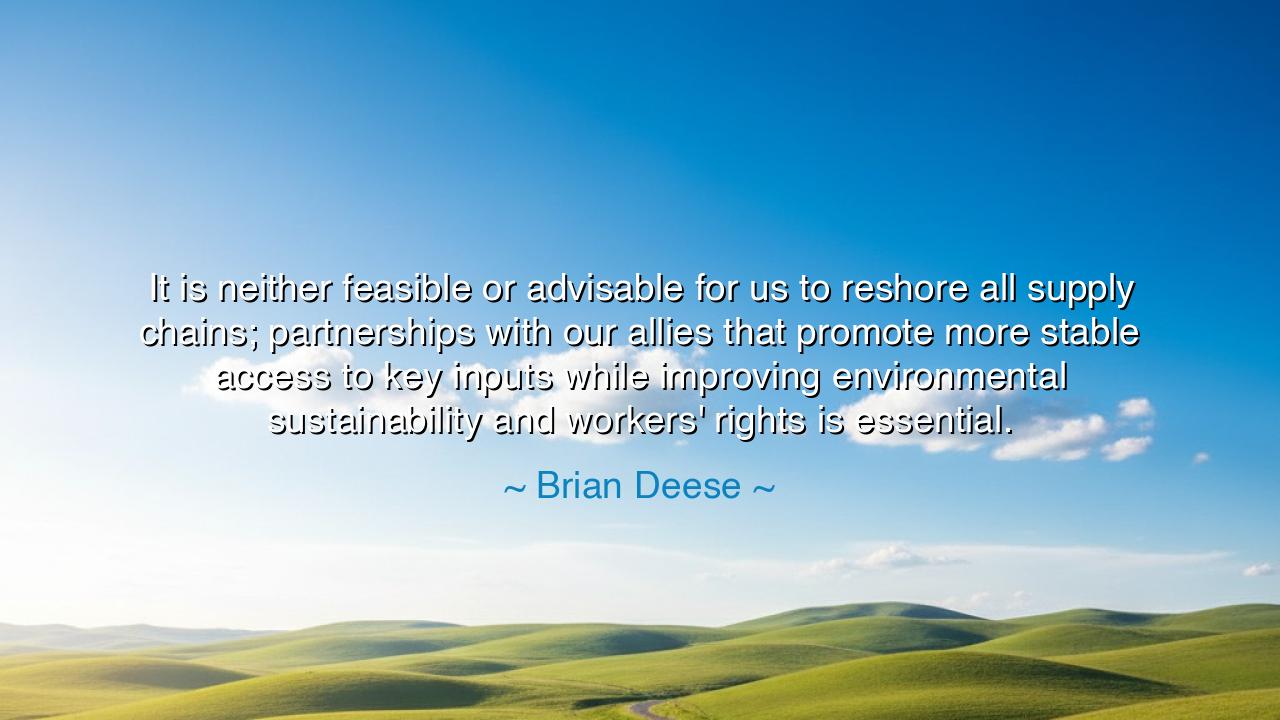
It is neither feasible or advisable for us to reshore all supply
It is neither feasible or advisable for us to reshore all supply chains; partnerships with our allies that promote more stable access to key inputs while improving environmental sustainability and workers' rights is essential.






Hear the words of Brian Deese, spoken in an age of uncertainty, when nations struggled with broken links and fragile networks: “It is neither feasible or advisable for us to reshore all supply chains; partnerships with our allies that promote more stable access to key inputs while improving environmental sustainability and workers' rights is essential.” These are not casual remarks, but the tempered wisdom of one who gazes upon the machinery of global commerce and sees both its fragility and its promise. His words remind us that strength is not born in isolation, but in cooperation; not in hoarding, but in sharing.
When Deese speaks of reshoring supply chains, he addresses the great temptation of nations in times of crisis—to turn inward, to wall themselves off, to imagine they can bear every burden alone. But he warns that such a path is neither feasible nor advisable. For no nation, however mighty, can command every resource within its borders. The minerals that power machines, the medicines that heal the sick, the technologies that connect the world—these are scattered across the earth, entrusted to many peoples. To cut oneself off from others is to court weakness, not strength.
Instead, he calls for partnerships with allies, a vision of solidarity across borders. These partnerships are not mere treaties of convenience but bonds of trust, built to secure access to what is most vital while upholding what is most just. For Deese does not speak only of goods and markets; he joins to this vision the sacred duties of environmental sustainability and workers’ rights. Thus, the pursuit of supply is bound with the pursuit of justice, so that the prosperity of nations does not come at the cost of poisoned earth or broken laborers.
History gives us a mighty example in the Marshall Plan after World War II. Europe lay in ruins, its people starving, its economies shattered. The United States, rather than seeking only its own advantage, forged alliances through aid and cooperation. By helping rebuild, by sharing strength rather than hoarding it, it not only restored Europe but also forged a lasting bond of allies. The lesson was clear: partnership builds resilience, while isolation breeds weakness. Deese’s words echo this ancient truth, applying it to the modern struggle of supply chains in a world both interconnected and perilous.
The meaning of his words is also a warning: that without cooperation, scarcity breeds strife. If nations hoard resources, if they exploit workers without rights, if they drain the earth without restraint, then the supply chains upon which all depend will collapse beneath their own corruption. But if nations work together, balancing need with justice, commerce with conscience, then the chains become not fragile links but strong bonds of trust that can withstand storm and trial.
This teaching is both heroic and practical. Heroic, for it envisions nations rising above suspicion to build a shared destiny. Practical, for it acknowledges the limits of what any nation can do alone, and calls for deliberate choices that preserve both prosperity and morality. Deese’s vision is not of domination, but of cooperation—an alliance of peoples who understand that their fates are bound together, as surely as links in a chain.
Children of tomorrow, let this wisdom guide you: do not think that greatness lies in isolation, or that prosperity can be hoarded by walls. Instead, seek to build bonds—with neighbors, with communities, with nations. In your own lives, practice the same: share your resources, honor the labor of others, and live in harmony with the earth. Support leaders and companies that protect workers’ rights and honor sustainability, for in so doing you strengthen not only the present but also the generations yet to come.
Thus the teaching endures: that the weaving of supply and demand must be guided by justice and by cooperation. Allies, sustainability, rights—these are the pillars of enduring strength. Take this lesson into your hearts, and pass it forward, for only in unity shall the world’s nations withstand the storms of tomorrow.






AAdministratorAdministrator
Welcome, honored guests. Please leave a comment, we will respond soon